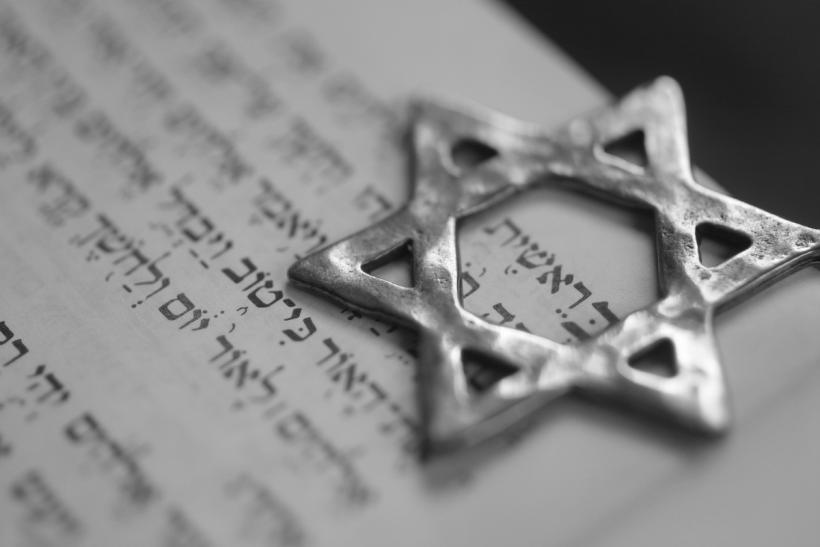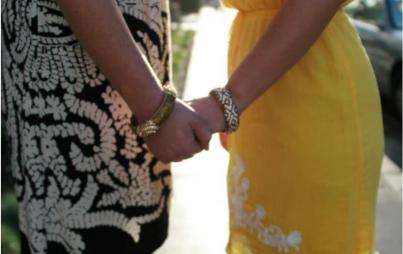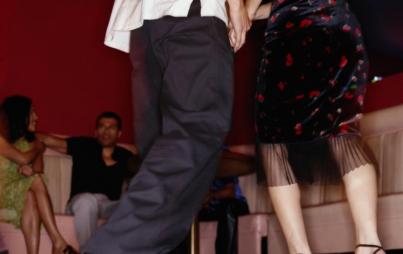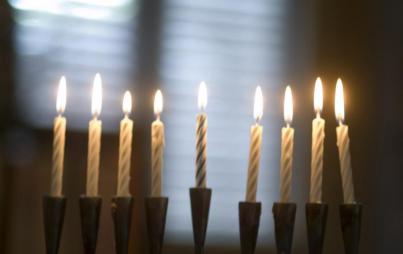
In recent times, Jews can again find their culture and identities being buried.
Long Reads is a bimonthly feature, showcasing long-form essays.
The Internet has been raging in the wake of the Charlottesville, Virginia tragedy on a recent Saturday afternoon at the Unite The Right rally — an event organized to unite white nationalist, alt-right, white supremacist, far-right militia, neo-nazi, and neo-confederate organizations. The groups gathered to protest the removal of a statue of Confederate leader Robert E. Lee from a public park. Heather D. Heyer, a paralegal from Charlottesville, was murdered by 20-year-old James Alex Fields, Jr. when he plowed into the crowd with his car, injuring 19 other counter-protesters at the rally.
Despite the overt agendas of several groups present — with swastikas, confederate flags, white supremacist slogans, Hitler quotes, etc., and with neo-Nazis, swastikas, and hate speech abound, President Trump still refused to call out white nationalists and fascists for their hate crimes. While a detail such as not naming names of specific groups could be misconstrued as merely overlooking details, refusing to name the racist aggressors is likely a purposeful move to not alienate a significant portion of his voter constituency.
“Even in a time where our past comes back to haunt us, we're still being forgotten."
With a rise in the fascist neo-nazi and white supremacist movements, directly addressing the hate groups is utterly necessary at this point. I would not say that there is a rise in these groups; however, they are emboldened by Trump’s victory and his tacit approval to be visible and organize out in the open. All of these groups, spare the alt-right, have been around for years, and anti-racist organizations and hate group watchlists have been tracking some of them for decades.
(Edit: After much cajoling, President Trump FINALLY called out specific hate groups last Monday, several days after the incident declaring “Racism is evil.” He then proceeded to backtrack during a rogue press conference from Trump Tower the next day, once again blaming both sides.)
However, even many of the most progressive and liberal circles are failing to show solidarity with all of the groups that were targeted. Many liberal groups and individuals have not addressed the tremendous impact this rally, and the renewed, bold visibility of these groups has had on Jewish people.
One would be mistaken to think that Jews were not explicitly targeted. Flyers circulated by one of the largest promoters of the event show a hammer smashing a Star of David, with the words “To End Jewish Influence in America.” Marchers were recorded chanting “Jews will not replace us,” referencing ovens and Auschwitz, along with “Sieg Heil” (the Nazi victory salute) and “Blood and Soil,” which was translated from “blud und boden” (a rallying call used by Hitler to draw a comparison between the “pure German blood” and the Jews who “dirtied” their country). These are not tangential anecdotes; these are purposeful, specific, targeted attacks. To dismiss or fail to address the impact such organizing, imagery, and words have on Jews when discussing Charlottesville is not only insensitive, it is dangerously complicit.
Jews are again faced with the stark reality that antisemitism is alive and well within the United States.
It’s desperately important that we include antisemitism in our conversations of solidarity with all of the marginalized groups targeted by the Unite The Right Rally.
In a conversation with Jewish activists and artists, of religious, secular, and cultural backgrounds, Ravishly asked for their perspectives on the political climate and what we can do right now to support the Jewish community and individuals in our lives.
What whiteness some Jews have been able to access in America is predicated upon decades of assimilation, often for the sake of safety and survival — and assimilation is itself a form of violence.
“I feel like a lot of people are not mentioning Jews or Jewish people at all in the groups which they want to protect. Even just naming Jewish people as part of this targeting would mean a lot to me. I don’t know if it’s intentional, oversight, or ingrained antisemitism, but so many of the liberal people that I see listing out populations of marginalized people (have omitted) Jews from the equation completely, despite our also being directly targeted,” says Nikki*, a queer Jewish femme, in conversation with Ravishly after the violence.
“Even in a time where our past comes back to haunt us, we're still being forgotten,” Olivia* adds.
While many Americans thought they had vanquished the threat of another antisemitic-fueled uprising when World War II came to a halt in 1945, Jews themselves know that the threat has always been real. Violence against Jews continued to exist in many parts of the world through to the modern day. Many, if not most, have been living with *the impact of intergenerational trauma and often exercise caution.
The United States has its own tremendous history of antisemitism.
The U.S. blocked Jewish immigrants from seeking refuge in America via the Johnson-Reed Act of 1924 (just years after the first World War), returning over 900 Jewish refugees to Europe in 1939. Let's not forget the targeted violence against Jews who went into the South to assist in registering voters during the Civil Rights Movement and an uptick in recent attacks against synagogues and Jewish schools.
We’re taught to “never forget” — be it the millions of Jews and others who perished at the hands of Nazis or were casualties of the war and its brutal conditions — but nuance is lost on many. As Lily Herman points out, “Jews weren’t specifically targeted just for their religion, but also because Nazis believed they were a different and inferior race that needed to be ethnically cleansed.”
Don’t let what you think you already know about the Holocaust desensitize you to the fact that within living memory, two out of every three Jews in Europe alone were massacred. By some estimates, as of 2012, less than 0.2% of the whole earth’s population is Jewish.
In recent times, Jews can again find their culture and identities being buried. Ironically, the difference in Jewish identity and culture is often mistakenly erased in the name of intersectionality. Many American liberals believe that Jews should now be considered “white,” but in fact, the question of race and Jewishness is much more complicated. Many Jews are people of color. Most Non-POC Jews still have only a conditional form of white privilege. A white-privileged Jew may receive all of the benefits of systemic racism in one part of the US and still be met with violence in another. What whiteness some Jews have been able to access in America is predicated upon decades of assimilation, often for the sake of safety and survival — and assimilation is itself a form of violence. Identity is a robust conversation even within Jewish communities, but the one agreement that can be reached is that Jews from all backgrounds are their own group, comprised of their collective Jewish identity and their multiple intersections.
“Speaking as a Jew of Color who's lived in many different places in (the United States) growing up, since we moved about every other year, I HAVE personally experienced racialized violence. I've had the shit kicked out of me, with my attackers (there were seven of them) yelling "Jew! Jew! Jew!," as if it was a curse word. I live in New York now and feel somewhat safer, but the intersections of oppression (I'm a Jew of Color, I'm Working Class/Poor, I'm Trans, and Sick and Disabled) intersect,” Tavi* tells Ravishly.
“DO NOT ASK US WHETHER WE SUPPORT ISRAEL AS IF THIS IS A DECIDING FACTOR ON WHETHER WE DESERVE PROTECTION...We are not obligated to answer for the actions of everyone who has ever been Jewish.”
Often held personally accountable for the actions of the State of Israel, antisemitism has changed faces and seeped into what some folks think are simply humanitarian “anti-Zionist” attitudes. This is especially prevalent among liberal circles who are otherwise well-intentioned and informed. Without seeking out information from many different perspectives on the very nebulous topic of Zionism and the intensely complicated history of Jews and their histories, diasporas, and exiles, one could look at the situation in the Middle East, consult popular progressive opinion, and think that they have an understanding. And while there are terrible things happening in the conflict between Israelis and Palestinians that must be called out, it is not as simple as American liberals often make the conflict out to be.
Meanwhile, the actions of the state of Israel have become a burden unjustly placed upon Jewish people around the world, as they are often interrogated as to their opinions on the conflict before being allowed into progressive spaces. Unfortunately, this often alienates many Jews from activist as well as other community-building opportunities. While Israel’s actions in many cases are colonizing, violent, and inexcusable, so, too, are the actions of many nations — and yet, Israel is the country most frequently singled out by progressive circles for criticism and condemnation.
“DO NOT ASK US WHETHER WE SUPPORT ISRAEL AS IF THIS IS A DECIDING FACTOR ON WHETHER WE DESERVE PROTECTION. If you have strong feelings about the politics in the Middle East, ask yourself why and why you feel the need to make that define your relationships with Jews who never have so much as been to Israel, to say anything about having a say in their politics,” says Anna*. “We don't all agree on the answers, and it isn't our job to defend ourselves, our religion, and our country of origin to you. We are not obligated to answer for the actions of everyone who has ever been Jewish.”
With 43% of the world’s Jews living there today, the State of Israel was officially created in 1948. Before that, the territory of Palestine and the greater Southern Levant was occupied by a population of Arabs, Jews, Arab Christians, Druze, and others. Modern-day Israel has a population comprised of similar groups, with a Jewish majority. American progressives are quick to forget, however, that thousands of Arabs are Jewish and POC-Israelis live in the country as well. And while many malign Zionism (as they understand it), and those Jews who would immigrate to Israel in search of a place that will protect them, as a direct attack on Palestinians and Muslims, we must also take into account what world events and history have forged this conflict as we know it.
At any rate, Israel is the world’s only majority Jewish state. And with Jews, again, at such a small percentage of the world’s population, for many, Israel’s existence as such is not insignificant. This significance, however, should be read for what it is — and not as a lack of support for Palestinian human rights or a lack of desire to end the conflict among Jewish progressives.
Related: Will My Interracial Relationship Survive Charlottesville?
“I feel like most people have a fundamental misunderstanding of BDS (Boycott, Divestment, Sanctions) which, for what it’s worth, I support where it's helpful to Palestinians, though sometimes it's harmful and actually results in lost income for Palestinians and that it isn't about ALL of Israel. It's about colonialism beyond the pre-1967 borders and Zionism,” activist Tavi* explains. “Until relatively recently (Zionism) was never about dispossessing Palestinians, but was about making sure all Jews had a safe place to call home. Much of my family in Israel/Palestine was there before 1948, and Jews lived and worked and cooperated with Muslims and Christian Arabs as well as Druzim with few incidences. This apartheid state was never what they envisioned.”
“Of course, opposition to Israeli policy and politics is not categorically antisemitic. Jewish activists would do well to remember that. People are allowed to criticize Israeli actions and to support the Palestinian people's right to existence and autonomy. I do both of these things myself. But the far Left can easily slide past reasonable criticism of Israeli policy into outright denunciation of the Israeli state's right to exist, or to bizarre anti-Jewish dog whistles,” Josh*, a Portland, Oregon-based lawyer tells Ravishly.
“Sometimes the distinction is subtle and unclear, but sometimes it's pretty blatant. Leftists rarely run around talking about “The Jew” like the Alt-Right does, but there is plenty of talk of "Zionism," and the terms seem to be used interchangeably. I don't think that everyone who uses the term is fully cognizant of the differences between the Zionist political party, the Israeli state, and the Jewish people in general. So my suggestion, if you'll have it, is that people STOP DOING THAT.”
“We don't have a great track record of people being there for us when the shit goes down. This is a real, legitimate fear to have. I want people to acknowledge that and tell me they get it and that they know we're part of the fight and they're not going to abandon us. At this point that is happening so infrequently that I feel intensely grateful whenever anyone remembers to include us,” Danielle* adds.
What can we do to help? Well, simply put: Include. Listen. Acknowledge. Protect.
Include Jewish identities in your conversation about safety and groups which need protection and are being targeted by this newest wave of violence. If you find yourself struggling or truly unwilling to do so, be real about your biases and get to work unpacking them. Examine the ways that these biases might affect how you interact with people of Jewish identities (and all other identities for that matter). Be willing to step up and call out antisemitic attitudes and behaviors even among the most progressive or “woke” activists in your group.
Step up and speak out when you see injustice.
*names have been changed








